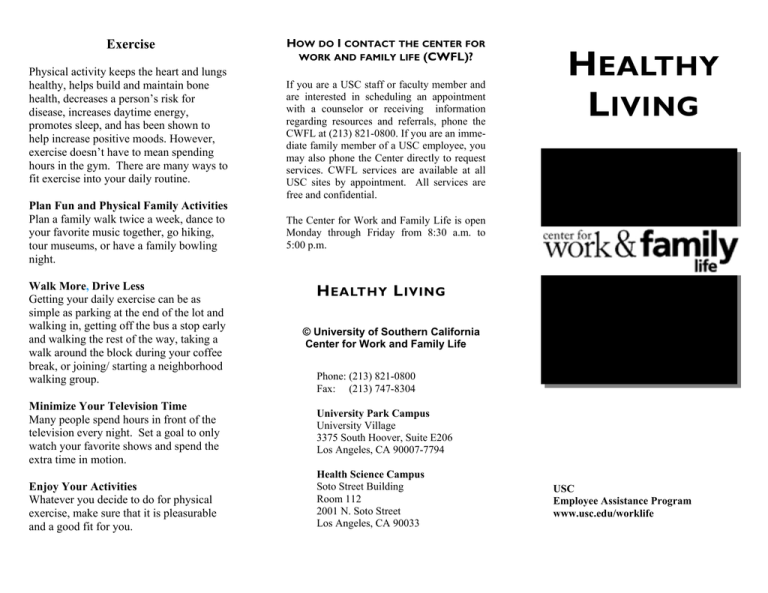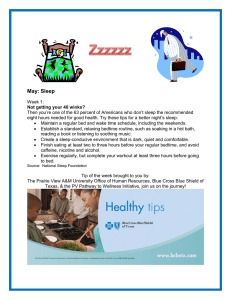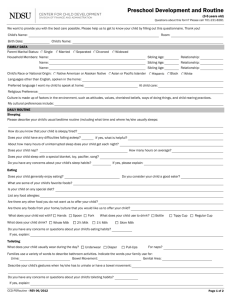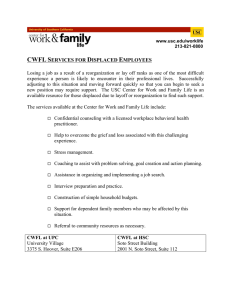H L EALTHY
advertisement

Exercise Physical activity keeps the heart and lungs healthy, helps build and maintain bone health, decreases a person’s risk for disease, increases daytime energy, promotes sleep, and has been shown to help increase positive moods. However, exercise doesn’t have to mean spending hours in the gym. There are many ways to fit exercise into your daily routine. Plan Fun and Physical Family Activities Plan a family walk twice a week, dance to your favorite music together, go hiking, tour museums, or have a family bowling night. Walk More, Drive Less Getting your daily exercise can be as simple as parking at the end of the lot and walking in, getting off the bus a stop early and walking the rest of the way, taking a walk around the block during your coffee break, or joining/ starting a neighborhood walking group. Minimize Your Television Time Many people spend hours in front of the television every night. Set a goal to only watch your favorite shows and spend the extra time in motion. Enjoy Your Activities Whatever you decide to do for physical exercise, make sure that it is pleasurable and a good fit for you. HOW DO I CONTACT THE CENTER FOR WORK AND FAMILY LIFE (CWFL)? If you are a USC staff or faculty member and are interested in scheduling an appointment with a counselor or receiving information regarding resources and referrals, phone the CWFL at (213) 821-0800. If you are an immediate family member of a USC employee, you may also phone the Center directly to request services. CWFL services are available at all USC sites by appointment. All services are free and confidential. HEALTHY LIVING The Center for Work and Family Life is open Monday through Friday from 8:30 a.m. to 5:00 p.m. H EALTHY L IVING © University of Southern California Center for Work and Family Life Phone: (213) 821-0800 Fax: (213) 747-8304 University Park Campus University Village 3375 South Hoover, Suite E206 Los Angeles, CA 90007-7794 Health Science Campus Soto Street Building Room 112 2001 N. Soto Street Los Angeles, CA 90033 USC Employee Assistance Program www.usc.edu/worklife HEALTHY LIVING Healthy Living Healthy Eating Tips There are many simple things that we can do each day to improve the quality of our lives. Eating healthy, exercising regularly, and taking time for ourselves are a few of the basics. While many of us know what this entails, practicing it is a different story. Often times it feels like too much work to make changes to our daily routine. Other times we implement changes but end up reverting to older, more familiar behavior, sometimes without even realizing it. A balanced diet can help improve mental alertness and increase energy. A healthy diet can also potentially decrease serious health risks. The following are some helpful hints: Making a Change Many times we criticize ourselves for not maintaining the new behavior or routine we have implemented. When making shifts in our daily behavior, it is important to only make a few changes at a time until they become habits. Self improvement through healthy living is a gradual process. Taking the first step to begin this process can seem overwhelming. Try to set realistic long-term goals and then develop small steps to work towards meeting your goals. Remember, no one gets anywhere without taking a first step. Make a commitment to yourself to make a change and start with the basics. Ask yourself: Am I eating right? Am I getting enough sleep? How much exercise do I get? Think Before You Buy Before going to the grocery store, make a list and stick to it. Become a Label Reader Read the labels of the products you buy. Pay special attention to serving size, saturated fat, hydrogenated oil, high sugar, trans fat, and sodium contents. Plan Ahead Time management plays an important role in eating healthy. If you know you are always short on time in the morning, make your lunch the night before. Keep healthy snacks available to grab in a pinch. Dried fruits, carrots, hard boiled eggs, nuts, and berries are great on-the-go options. Eat Slowly & Enjoy Your Food Eating can be one of life’s greatest pleasures. Eating slowly and consciously allows you to enjoy the flavor of your food and gives your stomach a chance to signal to the brain that it is full. Make Substitutions Substitute a piece of fresh fruit for candy treats. When out to eat, try a side of fresh greens instead of the fried option. Healthy Sleeping Sleep is paramount to mental and physical health. Sleep assists in stimulating immune function, memory, mental functioning, learning, and organ functioning. Here are some tips to help get you on track: Start a Routine Getting in a consistent sleep-wake cycle, even on weekends, is of the utmost importance. Avoid falling asleep on the couch or staying up late to finish a movie. Develop Rituals Keep the same routine every night before bed. This will give your body the cue to start relaxing and to slow down. Avoid Heavy Meals Before Bed Eating a heavy meal before bed can interfere with deep sleep just as much as going to bed on an empty stomach. If you must eat, have a small quantity of light food. Lessen Your Intake of Caffeine, Nicotine and Alcohol Before Bed Caffeine and nicotine act as stimulants to the body, thus keeping you up, while alcohol, a depressant, can keep you from getting uninterrupted sleep.





